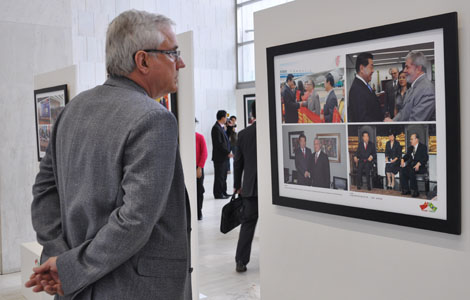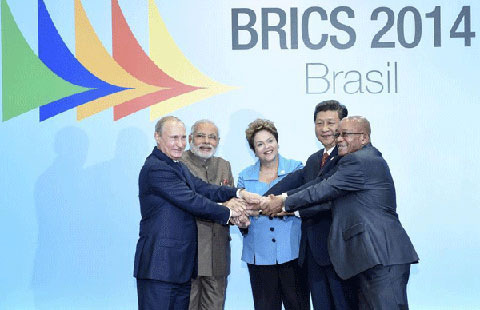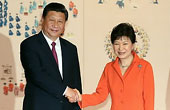Xi's visit underscores strategic nature of China-Brazil ties: expert
Updated: 2014-07-15 19:25
(Xinhua)
Comments Print Mail Large Medium SmallBRASILIA - Chinese President Xi Jinping's visit to Brazil underscores the strategic nature of China-Brazil ties, the extent of their economic exchange and their shared outlook on important global issues, says an expert.
The Brazil visit, Xi's first since he took office as president, is highly significant, said Severino Cabral, director of the Brazilian Institute for China and Asia-Pacific Studies, in a recent interview with Xinhua.
"During his previous visit to Brazil in February 2009, when he was vice president, Xi Jinping indicated that China and Brazil were developing a kind of cooperation that went beyond bilateral ties, one with strategic global influence," said Cabral.
"The recent events reaffirm and corroborate the president's view of the strategic nature of China-Brazil ties," he added.
During his visit, Xi will meet officially with Brazilian President Dilma Rousseff in Brasilia. This year also marks the 40th anniversary of the establishment of diplomatic ties between the two countries.
The bilateral ties have grown substantially over the past four decades, especially in the area of trade, with China having turned into Brazil's biggest trade partner. Bilateral trade totaled more than 80 billion U.S. dollars in 2013.
Brazil is one of China's main suppliers of raw materials, such as iron ore, grain and meat. It also imports manufactured goods from China.
China is playing a greater role in oil exploration in Brazil, with two Chinese firms forming part of the consortium that last year won the right to explore the South American country's largest oil field, the Libra ultra-deepwater deposit.
Cabral believed the relationship still has room to grow thanks to Brazil's industrial development.
Brazil can also diversify its exports to China to include technological products, Cabral said.
"We sell high-tech manufactured goods to China, such as aircraft and auto parts. The challenge is to develop our industry in areas where there is pent-up demand," said Cabral.
"China is poised to become the world's biggest importer, surpassing the United States and Europe. There will certainly be space for Brazilian industries in this gigantic market that is taking shape, but we have to build our niche in that market," he added.
To that end, BRICS countries, composed of Brazil, Russia, India, China and South Africa, could be of great help as they are set to hold their 6th summit in the Brazilian city of Fortaleza on July 15-16, according to Cabral.
One of the main topics members need to discuss at the gathering is the creation of the BRICS Development Bank, an entity designed to promote development in member states and other developing nations.
The creation of the bank could lead to the adoption of incentive policies to promote the participation of Chinese firms in South America, which could help Brazil launch a new cycle of industrialization, said Cabral.
The BRICS summit should also help improve cooperation between China and Latin America.
There will also be a meeting between leaders of China and the Community of Latin American and Caribbean States, during which "cooperation talks should be further deepened and the creation of a China-CELAC forum is expected," said Cabral.
The outlook for China-Brazil ties appears positive, Cabral said, noting the relationship has great potential for growth.
"I believe the future of Brazil-China ties will be brilliant, because they are two of the largest emerging countries, and certainly two champions of peace and global stability that concur to defend the principles of respect and sovereignty, independence and territorial integrity," said Cabral.





